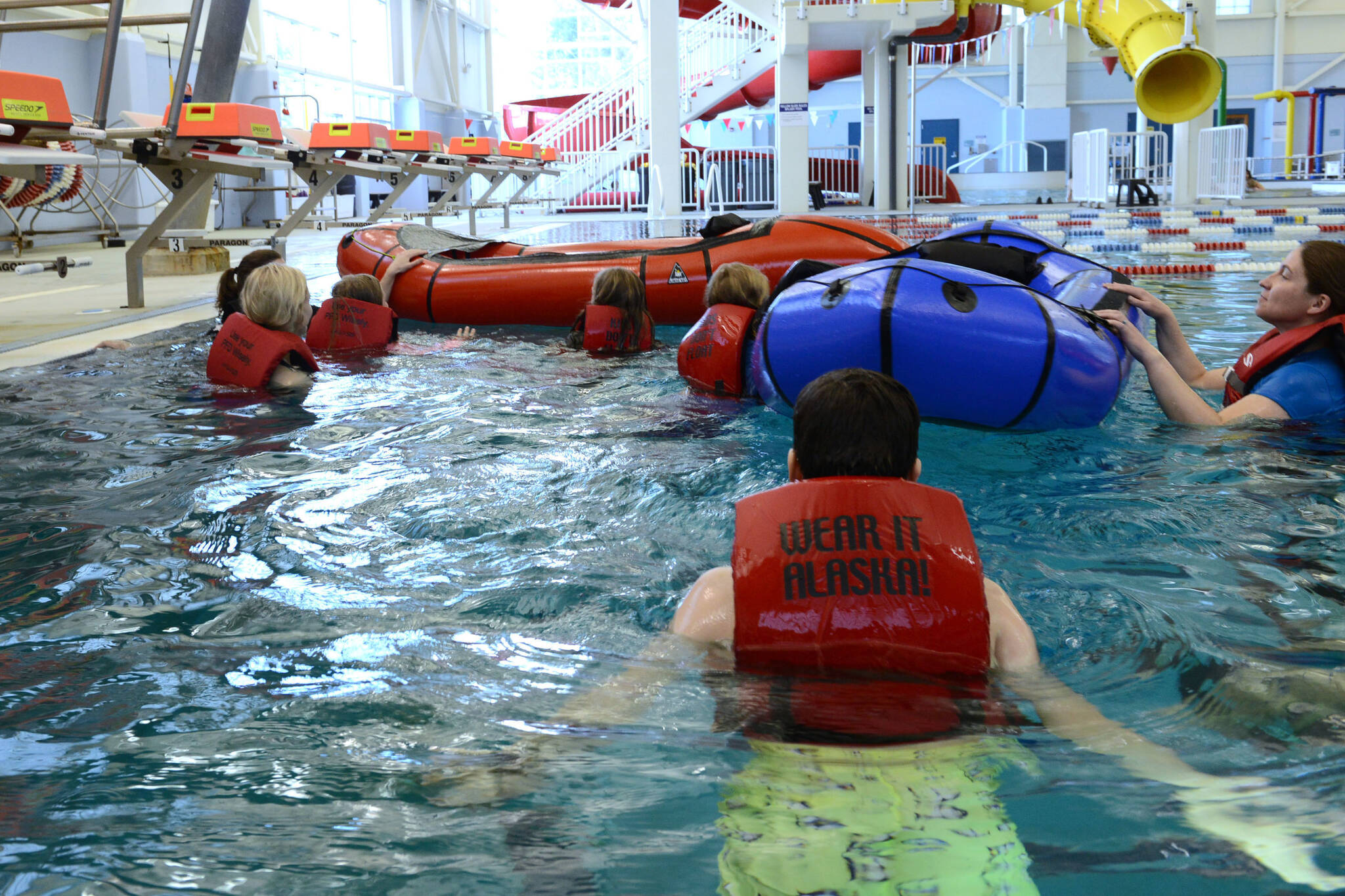Coast Guard volunteers, alongside trainers from Goldbelt Heritage Foundation and Xheighaa Warrior Veteran Canoe Journey, spent Wednesday morning training to give Alaska’s children boating safety classes.
The program began in its most basic form with District 17 in the late ‘90s, is a solid curriculum for training safety into children in the state with the most coastline in the country, said D17 boating safety specialist Mike Folkerts.
“We’re doing a Kids Don’t Float training program,” Folkerts said in a phone interview. “We’re training instructors to train kids to go out to boat safely.”
[Investigation concludes child accidentally burned down shed]
Eleven trainers, including four from the partner organizations, spent the morning at Dimond Park Aquatic Center learning to teach children boating safety.
“We brought the kids in so the instructors in training had a chance to work with the kids as part of their qualification to teach,” Folkerts said. “That’s going to be their student base when they go out to teach. We want to make sure they can relate to kids and get along and still get the content across.”
That knowledge is extremely important in Alaska’s ruthlessly unforgiving seas, said state Sen. Roger Holland, R-Anchorage, a long-serving member of the Coast Guard Reserve and supporter of the Kids Don’t Float program.
“I’m a big proponent of Kids Don’t Float. It’s a great program. It’s documented for having saved like 38 lives across Alaska since it was instigated and that’s just the one we know about,” Holland said in a phone interview. “It is weird to put a canoe or a small boat in a swimming pool. It’s fun for the kids, they love it. There’s a lot of real practical education going on with the hands on, the poolside part of it.”
The trainers, now qualified, are able to lead boating safety classes for children in the community, Folkerts said, with the partnering organizations extending that knowledge ever further.
“Our goal is to get as many people as possible passionate about teaching boating safety,” Folkerts said. “That kind of diversity in your instructor base is going to reach more people than a single group ever could. Partnerships is the key word.”
Teaching kids good, safe habits, such as wearing life vests at all times while on the water, is better for encouraging safety than enforcement efforts, Folkerts said.
“The kids love this. They get the full attention of the instructors, and they get to go in the water and play. That’s how you teach kids, make something fun. They learn it, they remember it,” Folkerts said. “They’re gonna make better decisions with education than enforcement. I can tell you to do it, but until you do it, you don’t really know. Until you’re in the cold water, you don’t understand what it does to you physiologically.”
Training Coast Guardsmen who might be assigned to cutters or other mobile forces carries additional benefits for the program and the communities, Folkerts said.
“On the Coast Guard side, it also gives the opportunity to multimission. If we send a cutter to Angoon, for example, we can also hold a boating safety class,” Folkerts said. “Every time we don’t have to go get somebody because they saved themselves, it saves the taxpayers money. It costs a lot to send a helicopter. It doesn’t cost a lot to have a boating safety class.”
The classes have four stations, including trying on life jackets, putting on life jackets while already immersed, a man-overboard station, and recovering to a small vessel after capsizing, Folkerts said. All of this is crucial in Southeast Alaska’s maritime-dependent economy.
“In Southeast Alaska, there’s three people for every boat. It’s the highest boat ownership per capita in the country. In Southeast Alaska, if you’re not in a boat once a year, you’re the anomaly,” Folkerts said. “We’re one of the last handful of states that have no form of mandatory boating education. Ours is voluntary but it’s very, very strong. We have some of the highest life jacket wear rates in the country. We’re three times the national average. We’re doing a good job with the education, we just need to do a little better.”
The mission of the Coast Guard, to rescue those in distress after catastrophe has struck, is crucial, Folkerts said. But how many times does the call not need to get made in the first place because those involved had safe boating habits ingrained in their daily lives, Holland asked.
“This is Alaska’s biggest lifesaving secret,” Holland said. “Our recreational boater fatalities are higher than anywhere else in the nation. It’s a dangerous place, Alaska. I believe the Kids Don’t Float Program saves lives. I hope we can extend it to the Lower 48 and Hawaii.”
• Contact reporter Michael S. Lockett at 757-621-1197 or mlockett@juneauempire.com.

